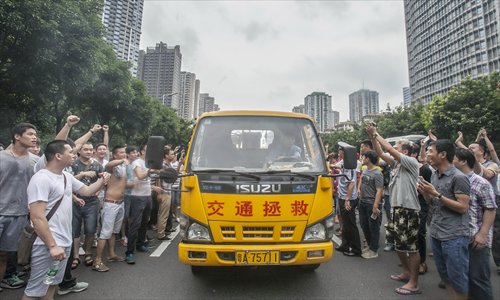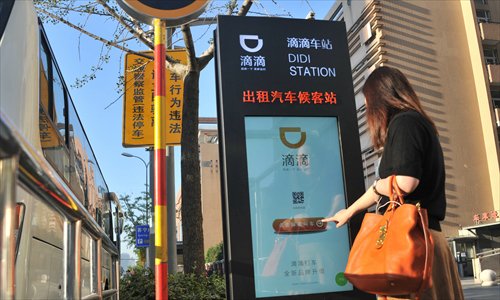Gloomy prospects for Uber, Didi as draft regulations put the brakes on amateur cabs
China's latest draft regulations on private car-hailing services may seriously harm companies such as Didi Kuaidi and Uber. The conservative draft, which requires car-hailing services to operate more like traditional taxi companies, has drawn opposition from legal and public administration experts. They have called for a more open attitude to these apps and the sharing economy in general.

Didi Kuaidi drivers celebrate the release of a fellow Didi driver following a protest in Guangzhou on June 10. The driver was arrested for driving "an illegal private taxi" in a police sting operation. Photo: IC
Winter might be coming for car-hailing apps in China - if recent draft regulations on private car-hailing services put forward by China's transport authorities become a reality.
Despite vocal objections from experts, industry insiders and the public, the Ministry of Transport said those who support the new regulations outnumber those who object, according to its latest analysis of all the comments it has received in the past month.
The draft regulations have been open for public consultation since October 10, and experts, car-hailing companies and government officials have engaged in discussions over whether they will help regulate an industry that has long lacked clear legal standing, or nip an innovative industry in the bud.
At the center of the debate is a conflict between a traditional, State run system and a more self-reliant, decentralized Internet-enabled system. Most experts believe that the current draft, favoring the traditional taxi industry model, will land a severe blow on Didi Kuaidi and Uber, whose major source of service providers have been private cars and private car owners.
Take the wheel
Car-hailing services currently occupy a grey legal area in China. Although private taxis are technically illegal in China, they generally find it easy to operate despite occasional crackdowns from local governments.
The draft, if passed, will likely force such services to act more like traditional taxi companies - firms like Didi Kuaidi and Uber, will need to acquire licenses, sign employment contracts with drivers, register and set up offices in all the areas where their services are provided - which will significantly add their operating costs. They will also have to hand over their ability to set prices to local governments.
Drivers, on the other hand, will have to take government-organized tests. They will also need to register their cars as vehicles for hire. Under China's laws, this means their cars will have to leave the road after eight years of service. This will likely scare private car owners away from the car-hailing business as it significantly shortens their car's lifespan.
To obtain the qualification, drivers need to take two exams. One on driving principles and practical abilities, each lasting an hour. The latter exam involves car safety inspections and emergency rescue skills, among others.
"The authorities are still using an old mindset, that taxis are taxis and private cars are private cars, erecting a huge barrier between the two. Any private car has to obtain a taxi license before they can be hired," Zhou Qiren, Dean of the National School of Development of Peking University, told Caixin Weekly.
The regulations came just two days after Shanghai, long considered a pioneer in China's economic reforms, became the first city in China to give legal status to a car-hailing company. It issued a license to Didi Kuaidi, the leading car-hailing company in China, on October 8.
Shanghai's plans were virtually the opposite of the national draft regulations. The city would not set prices, nor would be require cars to register as vehicles for hire. The responsibility to screen drivers and cars is in the hands of Didi Kuaidi, rather than the government.
Didi Kuaidi said in an announcement at the time that it was also in talks with other city governments about getting licenses, and other car-hailing companies said that they were in talks with the Shanghai government about the possibility of receiving a license. This raised the possibility that car-hailing services might soon see an expansion in China as more cities follow suit and legalize them.
But the Ministry of Transport draft has put an end to this possibility. Sun Jianping, a Shanghai traffic official, later said that the city will strictly follow national guidelines, but will enact more liberal measures in areas where the local government has authority to do so. This means that Shanghai will suspend its current plan for car-hailing apps until the national guidelines are officially decided.

A rider uses a Didi touch screen station to send her exact location to drivers on October 15 in Shanghai. Photo: CFP
Road rage
Didi Kuaidi tactfully expressed its disapproval of the guidelines through a polite public response. In three bullet points, it argued that the government should leave more room for part-time drivers and cars, which make up 75 percent of the drivers registered on Didi Kuaidi. Taking less than four trips a day on average, they are the driving force behind the growth of car-hailing services, it said.
"It is them who have made it easier to hail cabs. If the cars need to register as vehicles for hire and part-time drivers must take qualification tests, most drivers, along with their cars, will likely quit our platform, and it will be once again difficult for people to call a cab," the company said.
With investors including the China Investment Corporation - China's sovereign wealth fund - and Alibaba, Didi Kuaidi is considered to have the biggest say in China's taxi hailing app market, compared with other smaller or foreign players. Other companies are more discreet.
Liu Zhen, who oversees US-based Uber's China strategy, told thepaper.cn earlier that she has no objection to the guidelines. "In our operations in over 350 cities worldwide, we have more or less faced the same questions of our business preceding policymaking, and how the two should adapt to each other," she said, adding that the company has handed its comments to the Ministry of Transport.
Among the dozens of guidelines laid out in the draft, the ones that require private cars to be registered as taxis came under attack the most from experts. "The regulation has nothing to do with the sharing economy that is embraced by car-hailing services, because it forbids private cars to be shared, and copies the old system in which the government used to manage taxis," Wang Jun, associate professor at the China University of Political Science and Law, told Caixin Weekly.
Wang is one of 12 more liberal experts in law, public administration and urban planning who signed an open letter last month objecting to the regulations. The letter said there are several major flaws in the guidelines and they should not be approved.
"No one will share their new, good cars if they need to be discarded in eight years, and this means car-hailing companies will not be able to provide better cars and services," an industry insider told Caixin Weekly.
Cities like Nanjing and Harbin have all previously launched high-end taxis, but these projects have mostly failed due to high operating costs and the fixed 8-year lifespan for cabs that makes it even more difficult for the earnings to cover the costs.
The requirement for car-hailing companies to set up offices in every city or county where they operate was also considered absurd by the 12 experts. "Considering they are Internet-based, car-hailing platforms are naturally open to the entire nation. … It's hard to imagine taobao.com or JD.com being required to set up branches in every county or city where their products are sent to," the letter read.
"The guidelines ... have a strong inclination to favor the interests of the ministry," according to the letter, referring to the apparent pro-taxi bias. The letter also said the Ministry of Transport should not be the only ministry to draft car-hailing regulations, but should work with telecommunications, public security, commerce and banking authorities, among others.
Zhang Xiaoyu, associate law professor at the Chinese Academy of Governance, said in a public post,"We need to reflect on our backward management of traditional taxis, instead of putting shackles on an emerging industry and turning them into traditional taxis. This isn't fair play."
In its public comment, Didi Kuaidi also expressed its wish for the central government to offer local governments room to explore their own management of Internet car-hailing services, citing the Shanghai model as a practical and open-minded example.
"We hope the revised regulations could follow and promote the momentum of China's sharing economy," it said.
Apparent support
According to the Ministry of Transport, however, more people - 440 commenters - are in favor of private cars registering as taxis than those who aren't, who sent in a total of 379 comments, according to People's Daily Online. Another 27 comments said the category of "online booked cars" should be created, and these cars should be given more than 8 years on the road.
As to whether drivers should obtain qualifications, 126 commenters are in favor as opposed to 66 commenters who think it's not necessary.
The Ministry of Transport says it will revise the current draft based on these comments.
Wang Limei, vice chairman of the China Road Transport Association, said the new regulations are merely following what the entire road transport industry needs to comply with, that is, that cars, drivers and service operators should all meet certain qualifications. "The main purpose of the draft is public safety, and regulating qualifications will help boost that," she told Caixin Weekly.
Global Times - Agencies
Newspaper headline: Fare changes?